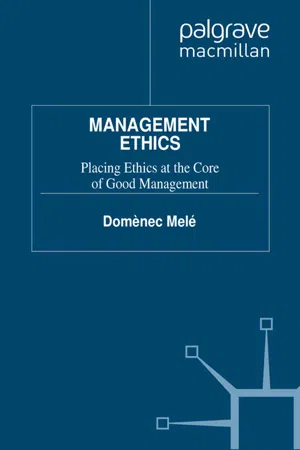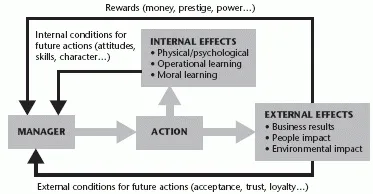
- English
- ePUB (mobile friendly)
- Available on iOS & Android
eBook - ePub
About this book
The recent financial crisis has awakened a renewed sensibility to ethics in business and management, and an increasing interest in a better understanding of how ethics and economics are intertwined. Managers and executives must understand not just the moral value of ethical behaviour, but also how this can strengthen and benefit the organization.
Frequently asked questions
Yes, you can cancel anytime from the Subscription tab in your account settings on the Perlego website. Your subscription will stay active until the end of your current billing period. Learn how to cancel your subscription.
No, books cannot be downloaded as external files, such as PDFs, for use outside of Perlego. However, you can download books within the Perlego app for offline reading on mobile or tablet. Learn more here.
Perlego offers two plans: Essential and Complete
- Essential is ideal for learners and professionals who enjoy exploring a wide range of subjects. Access the Essential Library with 800,000+ trusted titles and best-sellers across business, personal growth, and the humanities. Includes unlimited reading time and Standard Read Aloud voice.
- Complete: Perfect for advanced learners and researchers needing full, unrestricted access. Unlock 1.4M+ books across hundreds of subjects, including academic and specialized titles. The Complete Plan also includes advanced features like Premium Read Aloud and Research Assistant.
We are an online textbook subscription service, where you can get access to an entire online library for less than the price of a single book per month. With over 1 million books across 1000+ topics, we’ve got you covered! Learn more here.
Look out for the read-aloud symbol on your next book to see if you can listen to it. The read-aloud tool reads text aloud for you, highlighting the text as it is being read. You can pause it, speed it up and slow it down. Learn more here.
Yes! You can use the Perlego app on both iOS or Android devices to read anytime, anywhere — even offline. Perfect for commutes or when you’re on the go.
Please note we cannot support devices running on iOS 13 and Android 7 or earlier. Learn more about using the app.
Please note we cannot support devices running on iOS 13 and Android 7 or earlier. Learn more about using the app.
Yes, you can access Management Ethics by D. Melé in PDF and/or ePUB format, as well as other popular books in Business & Business Ethics. We have over one million books available in our catalogue for you to explore.
Information
CHAPTER 1
WHY GOOD MANAGEMENT REQUIRES ETHICS
Management in industry at the present time has the blood of a new youth coursing through its veins. It is full of a new vigour and a new enthusiasm. Its practice is being overhauled, both from the scientific and from the ethical points of view.1
OLIVER SHELDON (1894–1951), Chief Executive Officer and a writer on management in the 1920s
The author of these words was the CEO of Rowntree’s, a family business based in York, UK, whose activity was centered on confectionery.2 In Sheldon’s time, Rowntree’s was a growing company. He successfully restructured it and adopted a more functional style and professional culture.
Along with his managerial activity, Sheldon wrote a book entitled The Philosophy of Management, which is a small gem of early management thought. Contrary to other influential thinkers of his age, he held that good management was much more than technique. It also encompassed concern for people and ethics.
In Sheldon’s view, good management should provide decent working conditions and should consult with employees and involve them in decision-making in the workplace. He thought that industry existed for more than the profit of shareholders. Service to the community was the primary motive and fundamental basis of industry.3
Management has been defined in a very simple but comprehensive way as “the art of getting things done through people”. According to Peter F. Drucker, “management is the specific and distinguishing organ of any and all organizations”.4
Understanding management in its broadest sense, it can be said that this activity has been exercised since ancient times.5 However, modern management thought began in the late 19th century. The manager’s task is to promote effective and efficient cooperation in order to achieve common goals in organizations. However, this is not all. Management is a human, not mechanical activity. It is carried out both by people and for people – conscious and free beings – and this involves ethics.
One very simple and intuitive approach to ethics is to consider the service or damage to those people who receive the effects of a human action. Another way is to pay attention to what is generally considered personal moral qualities. Integrity, trustworthiness, courage, sense of service, and their antonyms, are examples of these. Although ethics is actually much more complex than this simple outline, this introduction may be sufficient for the purpose of this chapter. We will try to explain ethics more extensively in the next chapter.
Here we will firstly discuss how ethics, in a positive or negative sense, are intrinsic to management. For this purpose, we will begin by analyzing the dynamism of the manager’s action, including the effects on both the agent (manager) and the recipients of the action, and its subsequent consequences. We will argue that ethics are embedded in management in three different ways: (1) through managerial decisions, (2) through the ideas and values (ethos) which drive the practice of management and (3) through the manager’s moral character. We will then consider the favorable consequences that ethics has in management, and finally we will discuss why good management requires ethics.
THE MANAGER’S ACTION AND ITS DYNAMISM
In order to understand why ethics is an essential part of good management, it is necessary to consider the manager’s action and its dynamism, that is, the effects of such action and the subsequent consequences for future actions. At this point it is important to escape from the narrow view of managerial action focused exclusively on efficiency and economic results and to consider the whole picture of the manager’s action, including its effects and the response of those who in one way or another are recipients of that action (Figure 1.1).
As with any human action, the manager’s action has effects which are both external and internal for the agent (the manager, in our particular study).
External effects
A manager’s decision and subsequent action bring about three different types of external effect:

FIGURE 1.1 Dynamism of the manager’s action



Internal effects
Taking a decision and performing an action also brings about internal effects for the agent, and these effects can generate learning which will influence future actions. Three internal effects can be distinguished:



Dynamism of the action effects
Both external and internal effects have an influence on the agent. External effects have repercussions on the agent, firstly from business results. They provide rewards in different ways, including money, prestige, power and so on. In contrast, these effects may also be negative. The impact on people and the environment has repercussions for the agent, too. People receive the action impact and learn whether or not it is favorable to their interests. They also perceive the moral quality of the action and evaluate the integrity and honesty of the agent. As a consequence, they respond to the agent in favorable or unfavorable terms, praising or recommending the product, being predisposed to buy other products of the same brand and so on, or the contrary. Environmental impact can also be evident, either directly or through people for or against a managerial action. In summary, the reactions of people and, to some extent, that of the environment, provide conditions, favorable or otherwise, for future managerial actions.
Internal effects, as noted, have an influence on managerial attitudes, skills and in the development of the moral quality of the manager. Internal effects are cumulative and in each situation the manager – like any other human being – is endowed with the internal effects of his or her previous actions. Managers have skills and experience acquired through their actions and certain moral habits, good or bad, also acquired through their deliberate and free actions. Thus, there are managers with great integrity and others with less. In a certain sense, each manager is a result of his or her biography, being made up of a great number of deliberate and free actions.
ETHICS IN THE MANAGER’S DECISIONS
We can find ethics as an intrinsic element of the manager’s decisions, and consequent actions, by considering that (1) managers, in being rational and free agents, have the capacity to experience responsibility and bear it, and (2) human actions involve morality, since they affect people and the environment for good or bad.
Responsibility inherent in any deliberate and free decision
Moral responsibility is a key concept in ethics, and a generally shared experience. This means being answerable for one’s own decisions regarding good or bad. We may well agree that “most people, most of the time, take, or want to take, responsibility for the effects of their decision and the corresponding actions on others”.6 Ethics presupposes the capacity to make decisions and to act in one way or another or even to refrain from a certain course of action.
The manager’s actions are, first of all, human actions, carried out with deliberation and freedom. Like any human adult with sound mental health, managers are capable of reflecting on their actions, on the situation in which they find themselves and the foreseeable consequences of such actions. They form intentions about how they will act and, what is more, they experience that their actions are their own, that is, they proceed from their own freedom; and consequently they are aware that they should answer for what they have decided and done. Being the author of his or her own actions, the manager bears the responsibility inherent in any human action.
Societies, too, from very ancient times have held that people – including managers – are responsible for their actions, although such responsibility can be attenuated or fully excused by certain cognitive, psychological or social factors. This is the basis on which people deserve praise or blame for what they do and the justification for penal codes.
There are vast studies on legal responsibility, including that of managers, which develop the idea that managers bear certain responsibilities in accordance with the law. But beyond legal responsibility derived from legal duties, managers bear moral responsibility for their actions derived from the above-mentioned human capability of reflecting on one’s own actions and their consequences, and being aware of how these affect people. In some cases, legal d...
Table of contents
- Cover
- Title
- Copyright
- Contents
- Preface
- Chapter 1: Why Good Management Requires Ethics
- Chapter 2: Basic Ethics for Good Management
- Chapter 3: Ethics in Managerial Decision-making
- Chapter 4: Centrality of the Person in Management
- Chapter 5: Managing Corporate Responsibility and Sustainability
- Chapter 6: Moral Competencies of the Manager
- Notes and References
- Author Index
- Subject Index